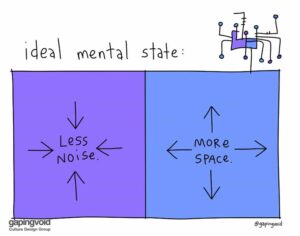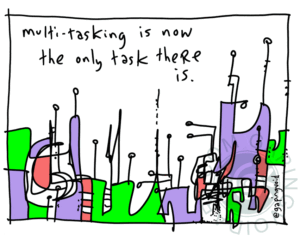Doctor AI, I Need Your Help… STAT!
A Doctors Perspective: Why We Need Rapid and Immediate Adoption of AI in Healthcare
I recently had the privilege of participating in a debate during the Canadian Health Informatics Executive Forum (CHIEF), which followed Digital Health Canada’s 2024 eHealth Conference. The resolution stated: “Be it resolved that: Rapid and immediate adoption, at scale, of artificial intelligence in diagnosing and treating patients is the only way to address current clinician capacity challenges.” The wise Kimberly McGrail of the University of British Columbia supported me on the affirmative side. Hard-working debaters on the negative side were innovation and AI expert Dr. Alexandra Greenhill, CEO of Careteam Technologies, and the feisty and able implementation expert Heidi Geisbrecht from BC PSHA. These were my arguments for the win… 🙂
The Current State of Healthcare
Clinicians are Overwhelmed by Non-Essential Tasks
Ladies and gentlemen, I am a rare breed and an endangered species. You see I am a family doctor and I have practiced comprehensive primary care in rural, suburban and urban environments for the past 34 years. But…. I am an old man. I won’t be doing so for much longer. I am going the way of the dodo bird.
Don’t get me wrong, I love the practice of medicine and seeing patients. It gives me great joy. But like every other family doctor in Canada right now, I need a life raft. You see, I am drowning in paperwork—insurance forms, requests for information from lawyers, six page documents to get my patients a disabled parking permit, 20 page discharge summaries to read from a two day hospital on a 14 yo with appendicitis, endless lab tests ordered by well-meaning specialist colleagues, gunk from “wellness practitioners”, requests for sick notes, disability certificates, vaccination certificates, useless drug reconciliations (thank you Big Pharmacy!!) on patients using only two routine puffers for their asthma…. The list goes on and on!
Family doctors describe it as like being a hamster on a high speed wheel, except the wheel is made of bureaucracy. Most of these tasks are administrative. Most have been downloaded on me from someone or somewhere else.
I have created an invisible friend. A doctor to be my friend in these lonely times. I call him Doctor AI. So why him? Now or very soon he can can take over many of these tasks, giving me more time to actually care (did you hear that?? CARE!!!) for patients.
Doctor AI, bring back my joy.
Rising Demand and Complexity
Our patients are living longer and with more chronic illnesses. Looking out for them is like trying to juggle flaming swords while riding a unicycle. Not only do they need me to look after their illnesses, but in addition I am expected to follow endless guidelines on optimum treatment and prevention, preventing the four dark horsemen (coronary disease, diabetes, cancer and neurodegenerative disease) at every visit. Keeping up with everything recommended on every patient at every visit would take an estimated 26 hour day.
AI is the ultimate health detective, integrating genetic, behavioral, and social health data to give a complete picture of a patient’s health. This holistic approach enhances diagnosis and treatment. I need it as my brain shrinks and the demand grows.
AI can help manage this spiral by finding the people who actually need to be focused on, educate them for behaviour change when I cannot be with them, keep them motivated, triage their problems, streamline diagnostics and treatments options, and yes, even prevent them from being lonely, ensuring everyone gets the care they need.
Doctor AI, you are smarter than me. Help me out here.
Inefficiencies in the System
Our healthcare system is as efficient as the Toronto Yonge subway line on a Monday morning. A train may arrive in one minute or 10. We have no way of knowing. The tracks are always being worked on making it hard to know if I should use it or take a bus. Like on the TTC, in healthcare we lack signals that work using real-time data analytics. The accountability for slowdowns is vague and ends up being on the user. We have no WAYZ for navigating care. When I cannot get care for my patient, it’s like a train not arriving; I have to walk, or find a bike share or take an uber to get where I am going. It’s hard work getting a referral accepted or an MRI booked and is so much slower than an efficient system.
AI can be our GPS, steering us through the congestion with precision and speed. With access to system data, it can revolutionize our referral process, or generate excellent targeted notes or help ensure no patient falls between the cracks.
Think of AI as the ultimate multitasker. While we handle complex cases, AI takes care of routine tasks, boosting our overall efficiency. It’s like having an extra set of hands that never get tired or a medical resident that never wants a coffee break or night off!!
Doctor AI, help me get home at night without being exhausted, confident that my patients are safe.
Lessons from the Pandemic
 Did you know that AI predicted the COVID 19 pandemic before our health leaders did? Just read about BlueDot and its signaling of a new disease pattern before most of us had ever heard of a city called Wuhan. The pandemic hit us like a tornado in a trailer park, exposing every weak spot in our healthcare system.
Did you know that AI predicted the COVID 19 pandemic before our health leaders did? Just read about BlueDot and its signaling of a new disease pattern before most of us had ever heard of a city called Wuhan. The pandemic hit us like a tornado in a trailer park, exposing every weak spot in our healthcare system.
AI was a superhero during COVID-19, helping track the virus, visualize it, code it in record time and develop vaccines to fight it. Imagine what it can do in a calm, stable environment trained on excellent data and overseeing a population of patients. How much better would we feel if we knew and AI tool was constantly looking for signals of important things we might be able to intervene sooner in.
Doctor AI, keep me one step ahead of disaster.
The Role of AI in Diagnosing and Treating Patients
AI as a Diagnostic Tool
AI is like having Sherlock Holmes on your medical team—analyzing vast amounts of data quickly and accurately then predicting and looking further for things going wrong.
It reads around edges in X-rays where humans forget to look. It can find snippets of DNA code mutation that signal a significant risk of illness and become a target for novel gene therapies and medical treatments.
Already, in Ontario, machines read almost all of our Pap smears. There is endless potential for the same in histology and pathology. AI can see trends in ER visits that link back to a bad batch of cantaloupes or identify a restaurant worker who has hepatitis A and does not wash his hands. AI looks around corners, goes deeper, compares endlessly and alerts us of subtle blind spots.
Early diagnosis and signaling not only identifies masses of people who we can help the most, but overall, it also finds unique patterns of individuals that can be targetd for change. In doing so it can reduce our workload and help us manage high patient volumes efficiently.
Doctor AI, find things I miss, didn’t know existed or forgot to look for.
AI in Treatment Planning and Population Health
No one wants to be just part of a number that is averaged. No person thinks of their health as a place holder in a population cohort. Everyone wants medical care tailored to themselves, whether it is a simple as preventing an osteoporotic fractured hip, or as complex as expanding health span and life span with a view to longevity.
AI can whip up personalized treatment plans faster than a Ninja blender makes my protein/creatine /greens+ enhanced smoothie after my workout. It compares data from my biomarkers over time and over each other, with my genome, and phenotype, stacking these against my medical history, my personal preferences, and the latest research to ensure I get the best possible care decisions made without unnecessary delays. This is personalized medicine.
AI can also predict patient needs like a fortune teller with a crystal ball as it consumes data from wearable devices and PREMs and PROMs. It educates patients with analysis of literature that can be created for any level of education and translated into any language, cutting down on their reliance on the medical myth salesman and our arch nemesis, Doctor Google, reducing unnecessary worry or unneeded visits.
Doctor AI give my patients knowledge, and me wisdom.
Embracing AI as an Essential Solution
Is AI an existential necessity for our healthcare system? Absolutely. Without it, our current practices are about as sustainable as a ski hill in Dubai. I mean, it functions, but it’s not as fun as it could be, and as soon as the expensive energy runs out it’s gone.
Doctor AI, make it better for my young colleagues. Help them want a career in family medicine when they are scared to be commit to it in its current form. Help find a path forward for primary care.
A Call to Action
The future of healthcare hinges on our willingness to embrace AI at scale. It’s the only way to effectively and sustainably address clinician capacity challenges.
If we don’t adopt AI rapidly, we’ll continue to spiral into inefficiency and burnout and the speed with which we do so will increase. Our healthcare providers will continue to buckle under the pressure, leaving patients without timely and effective care. Inaction isn’t an option.
Paging Doctor AI !!! Code blue in the waiting room! Save us please!!!


One Reply to “Doctor AI, I Need Your Help… STAT!”
This is great. I didn’t know Pap smears are being read by machines already. I think the more we can show the public the benefits of these systems, the greater the trust and appetite would be for further application of the tech. Right now it sounds quite nebulous to the average Joe, but when we say it can double check – or take the lead followed by a human checker- radiographs, or find patterns in public health data etc, I believe it’s easier for patients to understand.